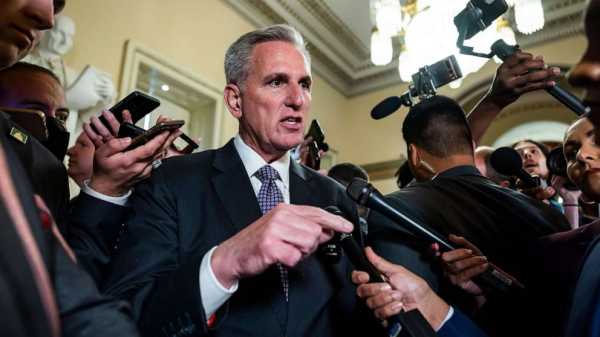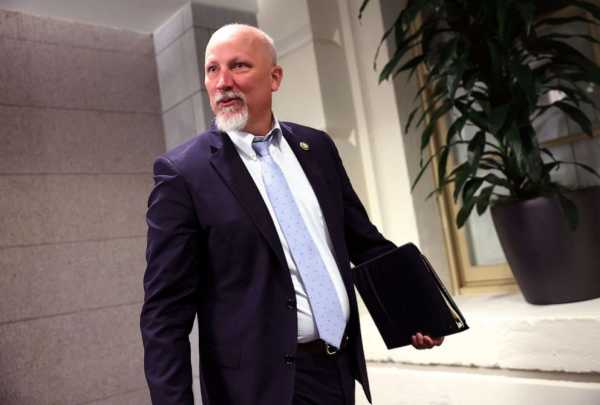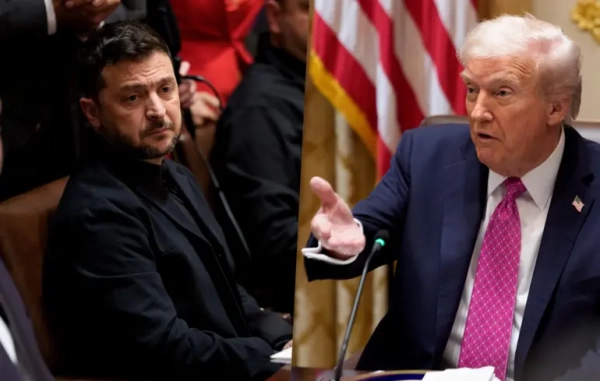Kevin McCarthy emerged in January from his historically chaotic speakership election confident, he insisted, that the disagreements among House Republicans were actually a clue to their future success.
"We go from the Reagan philosophy of 'if we agree with people 80% of the time, we're all together.' I like the idea of having a party so large that you have a lot of beliefs inside it," he told reporters at the time. "But you have a foundation of our beliefs, and I think what we went through last week will only make us stronger in the long run."
Nonetheless, skeptics abounded over whether McCarthy would be able to keep his members united enough to act on key legislation — and, more immediately, whether he could hold onto his gavel for a full two years.
"Speaker in Name Only," read one headline, referencing a series of agreements he made with other Republicans to win his role, including allowing any one lawmaker to be able to trigger a vote to remove him.
Now, as McCarthy urges the House to pass a bipartisan debt ceiling increase that he brokered days before the nation may default on its bills, his leadership style is back in the spotlight.
MORE: Congress has days to OK debt limit deal before default: Timeline of what's next
Leading GOP lawmakers are rallying around him, touting his negotiations with the Biden White House. Still, dozens of other conservatives in the chamber have defected at the same time that Democrats have invoked what they called a "commitment" that at least 150 Republicans will ultimately back the debt deal on Wednesday night before they will help make up the other votes.
The bill's failure risks upending the U.S. economy and its role in the international financial system.
For McCarthy, any single Republican could turn on him and call for a vote to boot him from his job.
It's a test — but one that strategists and allies say he appears set to pass.
"You can never avoid naysayers," Republican North Carolina Rep. Patrick McHenry, a negotiator on the borrowing and budget deal, told reporters Wednesday. "That is certainly in the nature of any major initiative like raising the debt ceiling. What I would say, though, is House Republicans are in a better situation now, are generically happier now, than at any previous debt ceiling that I've encountered in my 20 years here in the House."
Brendan Buck, an aide to past GOP Speakers John Boehner of Ohio and Paul Ryan of Wisconsin, told ABC News that while McCarthy isn't "completely safe" from rebellion, "I think he's actually in very good standing, and, to a degree that has surprised me, really has no threat against this job."
"It goes to what his strength has always been, that he works his members relentlessly, that he listens to them and that he's very present," said Doug Heye, another former House GOP leadership aide. "Quite often, especially, Boehner would tell them to pound sand. And I usually agreed with Boehner when he said that, that some of these members should pound sand.
"But Kevin, and this bill shows it, found a better way."

Speaker of the House Kevin McCarthy speaks briefly to the media on the day the House plans to vote on the tentative agreement between the White House and Congress to raise the debt limit in the US Capitol in Washington, D.C., on May 31, 2023.Jim Lo Scalzo/EPA via Shutterstock
'We're gonna do fine'
The debt ceiling fight was always anticipated by those in Washington to be the first existential threat of McCarthy's speakership, both because the GOP's hardline wing has pushed for sweeping spending cuts and because any dissatisfied member could move to boot McCarthy.
The agreement McCarthy and President Joe Biden ultimately rolled out last week, after McCarthy successfully pushed Biden to the negotiating table, was described as a compromise by them both, with spending caps on non-discretionary domestic spending, minor increases to defense spending, some new work requirements for certain aid recipients and more.
However, at least 30 House Republicans have said they plan on voting against the legislation, with many citing how much less it cuts back on the government compared with a party-line bill that narrowly passed the House last month (which the Democratic Senate rejected).
So far, only one lawmaker — Rep. Dan Bishop of North Carolina — has explicitly said he'd back a so-called motion to vacate the chair to force a vote on McCarthy's job as speaker. But other conservatives have raised the possibility.
MORE: Debt ceiling deal to be voted on Wednesday night
"If a majority of Republicans are against a piece of legislation and you use Democrats to pass it, that would immediately be a black letter violation of the deal we had with McCarthy to allow his ascent to the speakership, and it would likely trigger an immediate motion to vacate," Rep. Matt Gaetz, R-Fla., said on Newsmax this week.
McCarthy has brushed off any risk, saying "not at all" when asked Sunday if he worried about a possible motion to vacate.
He has repeatedly told ABC News he believes a majority of his majority will vote for the bill, too, though he conceded earlier Wednesday that some Democratic votes will be needed.
"I think we're gonna do fine," he said.
Describing his closing message to his conference, he told ABC News: "You are getting so many wins for the American people in this bill. Don't miss out. Don't sit back and say, 'I wanted to something so much more.' Yeah, there's a lot of things I want too, but this is one that moves us in the right direction."
'Generated a ton of goodwill'
Given that suggestions of a motion to vacate are mostly confined to the House's typical rabble-rousers, party experts said McCarthy would survive a vote — if one is even triggered in the end.
What's more, McCarthy supporters said that what could help him avoid the fates of Boehner and Ryan — both of whom resigned under pressure from the same kind of rebels hitting McCarthy now — is a concerted effort since January to give hard-liners a seat at the table.
Before running for speaker in January, McCarthy won over Reps. Marjorie Taylor Greene of Georgia and Jim Jordan of Ohio, among others. Even firebrands like Texas Rep. Chip Roy were kept in the loop, either by helping craft legislation behind the scenes or in public with seats on powerful committees.
"He's just generated a ton of goodwill with the members over the last five months, passing priorities of conservatives, hearing members out, making them feel like they are a part of the process and really creating a narrative of it's them versus the world," Buck said. "And that creates cohesion and teamwork."

Rep. Chip Roy walks to a House Republican Caucus meeting at the Capitol on May 30, 2023, in Washington, D.C.Kevin Dietsch/Getty Images
Indeed, McCarthy focused on passing bills on issues like immigration that have little chance of becoming law, given that Democrats have split control of the government, but still offer lawmakers something to present to constituents while shaping the political conversation.
"He just kept putting points on the board, every week could tell members that they're making progress on these things, that they can go home to their constituents and be proud of what they did," Buck said.
He pointed to how McCarthy has also put a premium on appearing in conservative media outlets to sell Republican legislation, blunting the prospect of grassroots grumbling, which has dragged on past speakers.
That "really helps, because one of the one of the challenges that his two previous Republican predecessors had was, eventually, they became boogeymen on the right, and everybody wanted to attack leadership," Buck said.
McCarthy's press-the-flesh style of leading has developed a deep enough well of support that it's not immediately clear a motion to vacate would even be triggered. Rep. Scott Perry, R-Pa., the chair of the House Freedom Caucus and an opponent of the debt ceiling bill, pumped the breaks on such a vote, Bishop said on NBC's "Meet the Press Now."
Yet even if a vote is called, strategists predict that McCarthy could beat it — and, with likely the thorniest issue pulled out of his side, punch his ticket to a full term as speaker.
"This is a flashpoint moment for a lot of members," Heye said. "If he's able to move this through the House on a big bipartisan basis, where's the argument to remove him on anything else?"
Sourse: abcnews.go.com






